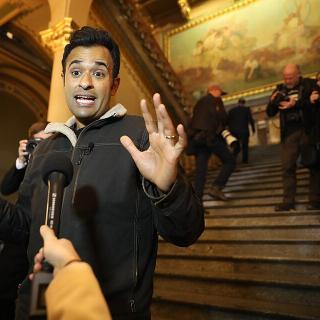Advertisement
In an election that signaled both political and generational change, longtime Hilliard resident Nadia Rasul emerged as the top vote-getter in the November 4, 2025 City Council race securing one of four open seats and becoming the first Muslim woman ever elected to Hilliard’s council.
Rasul’s victory was decisive and historic, but according to her, the reason she won was simple: “People want to feel heard.”
In an interview following the election, Rasul said that many Hilliard residents feel their voices come too late in the decision-making process. By the time citizens deliver public comments, the council has often already signaled how it intends to vote.
“That’s why people are frustrated,” she said. “They want a city government that listens before decisions are made.”
That desire for change combined with what many describe as Rasul’s deep and genuine connection to the community helped propel her to the top of the field.
Rasul has lived in Hilliard since 1991. For more than three decades, she has been known not as a politician but as a neighbor, a PTA mom, and a trusted local pharmacist. Many residents remember her for small moments that mattered including times when she delivered medication after hours to families unable to make it to the pharmacy.
Those acts, it turned out, were not forgotten.
While canvassing during early voting, Rasul knocked on a door where a woman immediately exclaimed that she had already voted for her, recalling how Rasul once delivered her family’s prescriptions late at night. At the next home, another resident screamed with excitement when she opened the door, saying: “You helped us so much at the pharmacy. I can’t wait to vote for you.”
Rasul said she never expected these interactions, especially from demographics she didn’t think she had achieved. But as one campaign volunteer told her that day, “I’ve never seen anyone get that reaction at the door. You’re going to win this thing.”
As someone who knew Rasul growing up, I saw firsthand the role she played in the schools organizing events, supporting students, and creating a sense of community long before she ever thought of running for office. Parents and children knew her for her warmth and her reliability.
When I asked whether her volunteer work helped her win, she told me, “My passion and energy resonate with people. Voters wanted to be part of something different.”
Young voters especially, she said, “were frustrated,” feeling reduced to endorsements and party machinery rather than genuine engagement. Rasul’s campaign intentionally opened doors to them, inviting teenagers to ask questions, help with canvassing, and see themselves reflected in local government.
At one event, a child ran up to her shouting, “You’re the lady from TikTok!” For Rasul, it demonstrated the importance of getting kids engaged early: “When young people feel included, they start asking questions, learning, caring – that’s how future leaders are made.”
Rasul was candid about the fear she felt running as a visibly hijab wearing woman.
“When I started, I was nervous to knock on doors alone,” she said. “I worried people wouldn’t be open to me because of my hijab.”
She began by visiting community events where she felt safer. But the more she knocked on doors, the more she was surprised and relieved by the overwhelmingly positive response. She estimates that 95 percent% of the residents she met were warm and welcoming.
“The majority of my votes in the primary were from non-Muslims,” she noted. “It showed me people saw me as part of this community first.”
The 2025 council race featured seven candidates vying for four seats and all four winning candidates were Democrats, marking the first time the seven-member council will be entirely Democratic. Rasul’s vote count placed her at the very top.
“It’s not a shock at all,” several residents told me. “She’s been here for us long before she ran.”
Her win reflects a city that has grown more diverse, more engaged, and more determined to see its leadership reflect on its people.
Despite the historic nature of her victory, Rasul insists this moment is not about her identity, but about service.
“I’m here to serve everyone, she said. “We are here for the voters.”
Rasul’s win is a reminder that change often begins close to home. Long before campaign signs appeared, she built trust one small act at a time. By Election Day, that trust became her strongest advantage.
Her story offers a lesson for local politics everywhere:
When people feel heard, they show up. When they feel represented, they vote.
En Español
Giro generacional y político lleva musulmana al consejo de Hilliard
de Jawhara Qutiefan 24 noviembre 2025
traducción: NS
Las raíces profundas en la comunidad dieron frutos como parte de un giro generacional y político, llevando a Nadia Rasul al consejo del pueblo Hilliard.
La victoria electoral se deba a la sencilla razón de que “La gente quiere sentirse escuchada.”
Lo anterior condujo a Rasul a uno de los cuatro escaños en las elecciones de noviembre pasado, con el resultado inédito que una musulmana tomará cargo en el consejo municipal correspondiente a esta pequeña ciudad ubicada al poniente de la zona metropolitana de Columbus.
Rasul consiguió el mayor número absoluto de votos en las elecciones comicios el 4 de noviembre porque, a su voz: “La gente quiere sentirse escuchada”.
Explicó a la Free Press que muchos habitantes de Hilliard tienen la percepción que sus voces están marginalizadas hasta después de que el consejo municipal haya tomado sus posturas. “Esto es lo que provoca tanta frustración; desean un gobierno que escuche antes de decidirse.”
Delineó que el anhelo para una mejoría se mezcló con la conexión genuina que la comunidad tiene con ella para lanzarse al primer lugar, ya que vive en Hilliard desde el 1991, con que lleva más de tres décadas siendo conocida como vecina, no como político.
Además de participar en el consejo de padres en la escuela, ha ganado confianza como farmacéutica. Abundan los ejemplos de su generosidad, como cuando entrega a casa medicamentos a altas horas de la noche.
Cuando arrancó la campaña electoral tocando puertas, una señora exclamó su alegría de que ya había votado por Rasul en agradecimiento por la entrega nocturna de medicinas, y su vecina abrió la puerta gritando con alegría: “¡Nos ayudó tanto en la farmacia! ¡Me arde sufragar para usted!”
Impactada por la efusiva recepción, admitía que no contemplaba haber ganado ningún reconocimiento en ciertas demografías. “Jamás vi semejante reacción apenas abriendo la puerta --observó un voluntario--, ¡Vas a ganar!”
La autora fue testigo ocular que de joven organizaba eventos escolares en apoyo a los estudiantes, fomentando un sentido de comunidad mucho antes de contemplar la política. Padres y niños sentían su calidez y confiabilidad.
En respuesta a la inquietud sobre si el voluntarismo fuera pilar en la victoria electoral, afirmó: “La pasión y energía hacen resonancia. Los electores quieren ser parte de algo diferente”.
Los más jóvenes “estaban frustrados” por ser relegados a prestanombres y acarreados en lugar de una participación plena. Rasul manejó una campaña propositiva donde los adolescentes debían externar sus inquietudes, apoyar la difusión y verse reflejados en el gobierno local en esta ciudad de unos treinta mil habitantes.
Hubo un niño que se acercó apresurado para gritarle: “¡Eres la señora de TikTok!”, lo que le ratificó lo importante que es involucrar a los niños desde una edad temprana ya que “cuando los jóvenes se sienten implicados, empiezan a cuestionar, aprender y sentir compasión. Así es como se forjan los líderes futuros.”
No se chivea en admitir el miedo que le infundía por portar el velo: “Al inicio estaba tímida en tocar las puertas a solas. Me preocupaba que no se me recibieron por mi hijab”. Se sentía más segura en los centros comunitarios pero, conforme sonaba los timbres, crecía el asombro y alivio por la calidez en la apertura de parte de 95 por ciento de los habitantes.
“La gran mayoría de los votos a mi favor en la primera ronda vino de personas no musulmanes, lo que me mostró que me vieron en primera instancia como integrante de esta comunidad.”
Un total de siete candidatos aparecieron en la boleta electoral, y los cuatro ganadores están en las filas del Partido Demócrata, con el resultado inédito en este pueblo que ese partido acapara todos los escaños.
Muchos hilliardenses me comentaron a guiso de que “no es ninguna sorpresa, porque lleva mucho tiempo entre nos desde mucho antes de lanzarse”.
Mientras es cierto que su candidatura refleja un cambio demográfico hacia la diversión y compromiso, ella insista que el momento de inflexión no se trata de su identidad, sino del sentido de servicio: “Estoy aquí para estar al servicio para todos y cada uno, estamos aquí para los votantes”.
Construyó la confianza a lo largo de muchos años, en pequeñas acciones una a la vez. Ellas se convirtieron en su fortaleza en la urna.
El aprendizaje para la política comunitaria en cualquier rincón queda en: cuando la gente se siente escuchada, responde, y cuando se siente representada, vota.


